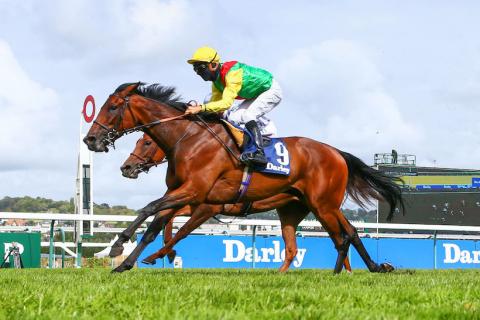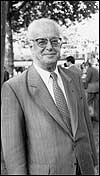20 August 2021

Photos scoopdyga.com, horseracingintfed.com
August, Deauville
DARLEY PRIX JEAN ROMANET
Group 1, 4-year-old and up Fillies & Mares, 2,000m/1m2f, €250,000
Créé en 2004
Last winner: AUDARYA (f4, FRA by Wootton Bassett ex Green Bananas, by Green Tune), owned by Alison Mary Swinburn, bred by Haras d'Écouves, trained by James Fanshawe, ridden by Ioritz Mendizabal.
Record-time: 2’04’’1, Ajman Princess (2017)
The race will be run in 2021 for the 18th time.
The 2020 edition
Sunday, August 23, 2020, Deauville. - The 17th Darley Prix Jean Romanet (Gr1) went to British raider Audarya (Wootton Bassett), who held off Ambition (Dubawi), who never gave in two months after a winning comeback in the Prix Corrida (Gr2).
The race was wide open, yet the two fillies left the field 4 lengths behind. Romancière (Dansili) stayed on in 3rd as Dariyma (City Zip), after travelling in the rear, finished well to snatch 4th place in front of Bolleville (Camelot), also seen behind most of the race.
Trained in Britain by James Fanshawe, bought for €125,000 at the Deauville sales, Audarya was a very successful and consistent performer on good ground last year, winning two races and finishing three times second, including once at Listed level. This season, on the other hand, she'd failed twice before winning again, most recently over 1m2f in a handicap on Newcastle’s all-weather track.
She is entered in the Prix de l'Opéra Longines (Gr1).
Her dam Green Bananas (Green Tune), bred in France by the Doumens at Haras d’Écouves, was trained by François Doumen. She was sold for € 2,000 in 2017 to Haras de Saint-Roch. She was exported to Tunisia.
History
This event was created in 2004 as part of the restructuring of the specific European race card for 4-year-old mares. In France, it serves as a trial for the Prix Vermeille, now open to fillies and mares aged 3 and over and contested three weeks later. The race’s name honours the memory of a prominent figure from the racing world. Since 2006, this race has benefited from sponsorship by Darley, the name covering Sheik Mohammed Al Maktoum’s entire breeding operation. In 2009, it was elevated to Group 1 status.
The race is therefore recent but it was a resounding success from the outset, and its track record brings together some of the greatest European champions of the young century. Pride, Satwa Queen and Stacelita, for example, marked their time.
Foreign winners
Filles and mares trained in France lead 9-8 against their British rivals, who have prevailed 7 times in the last 9 years though.
Jean Romanet (1914-2003)
 Jean Romanet devoted the majority of his life to the development of the Société d'Encouragement pour l'amélioration des races de chevaux en France (the precursor to France Galop), at both national and international levels.
Jean Romanet devoted the majority of his life to the development of the Société d'Encouragement pour l'amélioration des races de chevaux en France (the precursor to France Galop), at both national and international levels.
Born in December 1914, Jean Romanet was the son of René Romanet-Riondet, who served as general secretary of the Société d'Encouragement from 1925 to 1945 after succeeding his brother Maurice Romanet, who had held the post from 1915 to 1924.
Jean Romanet’s career began in 1938, as a senior civil servant at the Finance Ministry. In 1946, he was seconded to the finance committee of the Assemblée Nationale at the request of the rapporteur general, Charles Barrangé. He served there for fifteen years, assisting the committee’s different rapporteurs and chairmen, most notably Paul Reynaud and Pierre Mendès-France.
At the same time, Jean Romanet kept up a strong interest in racing inherited from his family. A well-known figure in equestrian circles, he rapidly became established as the leading authority on this subject after the Second World War.
At the request of Marcel Boussac, he produced Racing and Breeding from 1947 to 1950, a magazine that was as glossy as it was informative. Under a pen name (N.E. Marot), he wrote highly regarded articles on breeding in Sport-Complet, which took over from Paris-Sport after the war and later merged with Paris-Turf. He contributed to the magazine Courses & Elevage from its launch in 1954 and between 1945 and 1960, supplied the "Racing in France" section of the memorable English publication The Bloodstock Breeders' Review. He also provided numerous articles for the American weekly The Blood-Horse. Finally, like his father, he became a breeding advisor to Marcel Boussac, and when the latter became chairman of the Société d'Encouragement in December 1959, he opted to entrust Jean Romanet with the day-to-day running of flat racing’s governing body. A civil servant "on secondment", Jean Romanet thus became the Société d'Encouragement’s general manager in March 1961, a post he occupied until 31 January 1986.
When, on 19 December 1985, the society’s then-chairman Hubert de Chaudenay announced Jean Romanet’s imminent retirement to the committee, he paid the following tribute to his esteemed colleague:
"In view of the considerable role occupied by M. Jean Romanet within the institution, both in France and worldwide, you will not be surprised if I take a few moments to recall the main stages of his twenty-five years of activity among us.
"Made general manager by Chairman Boussac in 1961, his first task was to reform the structures of the Society, which had up until then been run in collegial form by the stewards, so as to create structures more in conformity with the possibilities of the committee members, whose own schedules made them less available than they had been in the past. Consequently, the current system under which we work was created.
"He then set up the common fund for breeding and racing and, always loyally and solidly supported by Chairman Boussac, brought order and method to the disorder that had previously reigned in the allocation of subsidies to the provincial bodies. He played an active role in the renovation of Longchamp, in terms of both the design and completion. With the aid of the stewards, most notably the Duc de Noailles and Yann de Chevigny, he oversaw the development of Chantilly and created the Lamorlaye and Avilly training centres.
"In social terms, he presided over the setting-up of the Moulin à Vent educational centre and of Chantilly hospital, the foundation for the action subsequently continued by the AGOSEC. At sporting level, he helped develop the pattern races project which, after being perfected by Weatherby, was adopted worldwide and permitted the internationalisation of the major events that had previously been made difficult or even impossible by the gap between the levels of races in different countries. Whatever objections there might have been to his expansionist preoccupation and unpopular ideas on productivity and the virtues of budget control, he soldiered on intelligently and efficiently with the duties of management and it is courtesy of him and his immediate staff that we have succeeded in reducing by around 50% the number of staff needed to operate the Société. And in international terms, he was also the creator of the international conference during the course of which, on the day after the Prix de l’Arc de Triomphe each year, the developed countries teach others how to organise racing correctly and gradually establish the international rules currently adhered to by forty-four nations.
"Audacious in conception, bold and effective in execution, firm in his principles and passionate in defence of this institution, he has been, for me, an incomparable colleague during the eleven years of a chairmanship stirred up by the effects of political reforms and the turbulence of the economic crisis.
"But unfortunately, a prophet is never recognised in his own land! Some reproached him for excessive harshness in the way he expressed his thoughts, a common flaw among those who believe theirs is the sole truth and thus put real passion into what they do. I myself have never subscribed to this view of him, and the same goes for the many representatives of foreign countries who showered him with distinctions.
"In 1972, for example, he was awarded a CBE (Commander of the Order of the British Empire) by Her Majesty the Queen of England; in 1975, he received the Eclipse Award from the Thoroughbred Racing Association for his contribution to the international activity of thoroughbred horse races; in 1979, in Canada, he was presented with the Sovereign Awards Trophy; in 1982, the Derby Award was bestowed on him in Great Britain by the International Racing Bureau; and lastly, in the USA on 4 October this year, he was given the Jockey Club Medal in recognition of his contribution to the racing and breeding industry. France owes the place it occupies in international racing as much to Jean Romanet as it does to the quality of its horses."
However, it was only a case of semi-retirement for Jean Romanet, who retained his chairmanship of the International Conference of Horseracing Authorities until 1993. Simultaneously, he has passed on the family tradition of serving the horseracing world to the fourth generation of Romanets, namely his son Louis, who was general manager of France Galop until the end of 2007.
Owners
- Khalid Abdullah (2 wins): Announce (2011), Romantica (2013)
- Helena Springfield (2 wins): Izzi Top (2012), Speedy Boarding (2016)
- Steven & Gillian Lamprell (2 wins): Satwa Queen (2006, 2007).
Trainers
- James Fanshawe (3 wins): Ribbons (2014), Speedy Boarding (2016), Audarya (2020).
- André Fabre (2 wins): Announce (2011), Romantica (2013)
- Jean de Roualle (2 wins): Satwa Queen (2006, 2007).
- Alain de Royer Dupré (2 wins): Pride (2005), Alpine Rose (2009).
- John Gosden (2 wins): Izzi Top (2012), Coronet (2019).
Riders
- Lanfranco Dettori (3 wins): Folk Opera (2008), Ribbons (2014), Coronet (2019).
- Maxime Guyon (2 wins): Announce (2011), Romantica (2013).
- Thierry Thulliez (2 wins): Satwa Queen (2006, 2007).